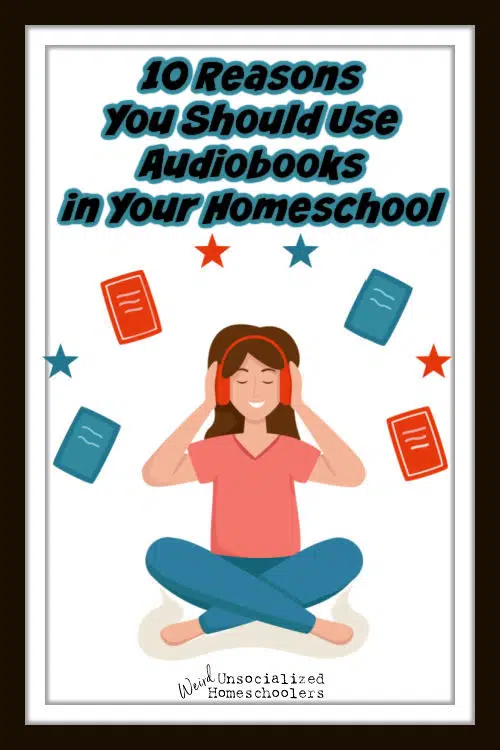10 Reasons You Should Use Audiobooks in Your Homeschool
10 Reasons You Should Use Audiobooks in Your Homeschool
“Audibooks don’t count as reading.”
I literally feel my jaw drop when people say this, whether they say it objectively or in sheepish humility regarding their own habit of listening to books instead of looking at them.
This is kind of a soapbox for me.
I have a long and complex love story with reading and education. Maybe I’ll delve into the whole saga in another homeschooling post one day. For now, I’ll just say this: my personal history – as both student and teacher- has left me with a strong appreciation for the way books (in all forms) can shape our lives. Because of all of that, I am unabashedly making the following declarations from my soapbox:
1. AUDIOBOOKS COUNT AS READING.
2. AUDIOBOOKS HAVE UNIQUE BENEFITS IN YOUR HOMESCHOOL.
Are there benefits to reading a physical book? Yes, sure there are! Among other things, decoding letters and words is an invaluable mental practice, especially for kids who are honing their reading skills. There’s also something meditative and important about disconnecting from tech and sitting with a book in your hand. As a parent, it’s nice for kids to see you holding a book instead of your phone. We all know these are good things.
No one is attacking or undermining the reading of physical books. There are uniquely good benefits to reading the traditional way. However, there are some special and educational benefits to audiobooks, too! Today, I want to share 10 reasons you should really be using audiobooks in your homeschool. I hope these give you some new ideas to try as well as an assurance that: YES, THEY “COUNT.”
10 Reasons You Should Use Audiobooks in Your Homeschool
1. Audiobooks create positive associations with stories and books for struggling readers.
As a once-struggling reader (and tutor to struggling readers), I know that one of the best things you can do to help your kids become good readers is to teach them that books are friends, not enemies. This is especially important if they haven’t learned to read fluently yet.
Anything you can do to interest kids in reading and help them to love stories will be beneficial. A love of books and stories is the most powerful motivation to keep going and not give up on reading. With great narrators, convenient use, and a variety of stories, audiobooks are a great tool that can help nourish any child’s interest in reading.
2. Listening to audiobooks has cognitive benefits for your homeschooler.
A major reason that audiobooks can be a great addition to your homeschool is that listening to them is a fantastic mental workout. Listening to audiobooks can help build many cognitive benefits, including several that are needed for traditional reading and other aspects of learning!
The practice of listening and following along for long periods of time can boost memory and focus. Listening to books at or above grade level can also offer exposure to more challenging vocabulary (in context) and increase comprehension skills. And of course, the practice of visualizing something you are listening to is a great exercise for the mind and imagination that becomes valuable in all kinds of reading.
I’ve met some parents who shy away from audiobooks because they believe that they will become a crutch for their struggling readers. However, the truth is that listening to audiobooks helps to build skills that will be needed in visual reading and all kinds of cognitive work. Think of it as a warming up for a run rather than using a crutch in the race.
3. Audiobooks offer deeper exposure to a variety of topics and interests.
There are a lot of great children’s books out there, as well as chapter books written for early readers. However, text that is written to match a child’s ability to decode doesn’t always match their ability to understand and question. Audiobooks can make it easier to share a wide variety of stories with children that are at their comprehension level, not just their decoding level. It also gives you, the parent, a way to see which stories your child is drawn to again and again and give you ideas for tangential learning in your homeschool.
For example, my 6-year-old daughter has listened to The Magic Treehouse Series by Mary Pope Osborne more times than I can count. She’s enjoyed doing so since before she could read, herself. It’s given us a lot of things to talk about for other subjects. Bonus: now that she’s reaching a reading level where she can read the physical Magic Treehouse books, listening to the audiobook versions has actually sparked her interest in doing so!
4. Audiobooks make homeschool sick days more entertaining and restful.
A homeschool day when your kids are sick, or when YOU are sick, probably looks different than the norm. Right? I’ll be the first to admit we do a lot of educational movies and shows in these situations. #Noshame. However, it can be nice to mix things up with restful, but still learning-beneficial, activities.
To this end, audiobooks are the best. Not only do they provide a soothing and educational mental distraction, but they allow for closed eyes (unlike movies or even physical books). This can encourage much needed rest and naps on sick days. And if you (the parent) are the one who is sick, you can get out some art supplies for your kids, put on an audiobook, and rest up for a while.
5. Audiobooks are perfect for homeschool road trips and taking language arts on the go.
I probably don’t have to tell you that audiobooks are an easier way to consume a novel as a busy adult. Personally, a gripping audiobook can make the 45 minute commute to Sam’s Club feel like me-time. It’s pretty magical. And that’s exactly why audiobooks are also a great resource for family road trips or even errand-running! You can’t read a book to your kids while you drive, and trying to do assignments while riding in the car may make some kids feel sick. Voila: audiobooks!
Download a book that lines up with where you are going on your summer vacation, or a historical novel that matches a period of history you’re learning about, and hit the road! My husband and his siblings were homeschooled, and cross-country travel was a big part of their education. They consumed many a book-on-tape (back in the day) on their travels.
6. Audiobooks can create independent time in your homeschool day (for you and your kids).
If you have several kids, work from home, or just want to carve out some independent learning time for your child/ren, audiobooks are a game changer! I have one child, and I homeschool her while also working from home a few hours a day. I realize that one child seems easy compared to multiple kids, and in many ways, it is easier. However, it also means that – in addition to being her mom and teacher-I’m also the primary playmate and attention-giver.
When we started kindergarten officially last year, I discovered a need for a couple of hours each day when I could work without interruption. I don’t have a problem with shows, but I didn’t want to resort to it so early on in the day (plus it’s hard for her go back to doing something structured once screen time enters).
That’s where audiobooks came in as a constructive part of our routine. After we’re done with one-on-one schooling, I’ll bring in “independent learning time” for an hour or two in the afternoon as part of our homeschool day.
The options include reading, art, LEGO or puzzles, and audiobooks. Usually, she chooses to listen to an audiobook while drawing or building something. Audiobooks have been a great way to create some guilt-free worktime for myself and encourage independent learning in my child.
Since homeschoolers often become more independent as they get older, it’s also a way to introduce this kind of time. It may not work for everyone, but it’s worked so well for us! (In fact, it’s giving me time to write this right now). If you’re looking for a way to create some independence/time in your homeschool, I’d encourage you to try building some audiobook time into your homeschool and find what works for you!
7. Audiobooks can help develop empathy and emotional learning.
Numerous research studies suggest that reading fiction fosters empathy (you can read one such study, here). And of course, that makes logical sense! When you read, you put yourself into the characters’ shoes and experience situations and feelings that you might not encounter in your own life. This massive benefit of reading applies to all forms of reading, including audiobooks.
Audiobooks can specifically help foster empathy and emotional learning as an extension of point 3 (exposure to a variety of topics and books). Like reading to your kids aloud, audiobooks can be another useful tool for introducing your reader to content that may be on his or her comprehension level (if not their decoding level). Among other benefits, this can help develop empathy and emotional learning.
8. Audiobooks don’t have to cost you a thing.
If you can’t tell, I’m a big fan of audiobooks, and we utilize them a lot in our homeschool. Therefore, a monthly subscription to Audible is worth it to me. However, you can start using audiobooks in your homeschool for nothing at all! That’s right–free! How? It’s because of our amazing homeschooling friend, the library! If you have a library card, you already have access to tons of audiobooks through the free, library-based app, Hoopla.
Just download the Hoopla app or go to the Website, plug in your library card info, and you can scroll through to find all kinds of great digital books, audiobooks, and even movies! The selection is more limited than Audible, but they switch out what’s available periodically. I use Hoopla alongside my Audible account to save money and discover new books.
9. Listening to an audiobook can be calming when you need a “reset.”
You ever have one of those messy homeschool days? Or maybe just a messy day in general? Bad attitudes or distractions or someone is sluggish? Whatever it is, a “reset” can be what’s needed. Sometimes a simple break can do a lot.
Audiobooks can be a great option for “resetting” your homeschool day. No matter what your age, there’s something so soothing about being read to, and it’s a great mental redirect from any drama or negative emotions. (Plus, wiggly kids can get their energy out while listening and it won’t interfere with any workbook-based assignments.)
10. Audiobooks are one more resource for building positive homeschooling memories.
As homeschooling parents, we all want our homeschool experience to be a positive one for ourselves, our kids, and our families in general! Ultimately, there are many different ways that you can use audiobooks as a helpful (and fun) resource in your homeschool.
Whether you use them to help inspire your struggling reader, strengthen reading skills, add some learning to your car time, or create some time when your kids can learn independently, audiobooks are a multi-faceted tool for your homeschool arsenal. As with anything else in the #homeschool life, try out some different ideas and find what works best for you!
Do you have some reasons you should use audiobooks in your homeschool to share? Or will you give it a try after reading this? Drop a comment and let us know your thoughts!
You May Also Like
100+ Books Made to Movies You Can Watch on Amazon Prime
How to Make a Book Page Garland
Comic Strip Book Report Template for Kids and Teens
Ten Living Books for Preschoolers
Katie Gustafson has been a member of the world of “weird, unsocialized homeschoolers” for a long time–first as an alumnus and now as a homeschooling mom to a fiercely fun little girl! She’s very into anything creative, especially writing, dancing, and painting. She’s also particularly passionate about literature and owns more books than she will probably ever be able to read. However, she reassures herself with the belief that, in the event of a digital apocalypse, she’s cultivating a much-needed physical library for future generations. Katie is happy to contribute articles to Weird Unsocialized Homeschoolers, Hip Homeschool Moms and Sparketh. She also has a personal blog on writewhereuare.com.







We love audio books! They spark so much imagination!
My oldest found she retains more of what she reads when she listens to a book while following along in the book. It has helped her feel more confident in discussions. Win/win!
YES!
Audiobooks are so important and such a blessing for children who have reading disabilities, visual processing disorders, visual impairment, or just retain auditory information better than visual information. I have completely flipped my opinion about audiobooks in the last couple of years. I used to think they were nice and fun but not necessary. I think this stems from the fact that I really have to see things written out to remember it and just listening to something does not stay in my memory easily. I started learning about dyslexia when one of my children was struggling so hard learning to read no matter what we did. During that study I heard the term “ear reading” and realized that I was expecting my child to learn the same way I do. Since then, we continue to work on eye reading but for learning content and information, my child is growing her skill of ear-reading. She is even growing so proficient that she can speed up the playback speed and ear-reads as fast as I can speed-read visually (while still retaining and comprehending the information).
Another benefit to audiobooks is the shared experience of listening together during car rides or bedtime. With five kids ages 1-13, it’s hard to read the same shared books but we can all listen to an informative audiobook and discuss it at our level of understanding. And audiobooks, as opposed to read alouds, do not rely on there being a person with the necessary reading ability having time to sit and read. We can listen to audiobooks together while doing chores or making dinner or drawing.
I agree on all points! I love the difference the addition of audiobooks has made on our homeschool day!
We have been using audiobooks the last month to help us get through some of our homeschool read alouds. We got “behind” and catching up means reading longer stretches, which no one minds listening to but dinner still needs to get made. So cleaning and chopping vegetables and folding and putting away laundry gets done and…”wait, did we just finish 4 chapters?” Definite WIN! We’re also using audiobooks a bit more because the trees around our house are FULL of cicadas. I’m in the dining room 12 ft from the tv and I can’t hear it (the child watching saturday morning cartoons is actually sitting entirely too close to the TV). Audiobooks help us boost the volume over the cicadas. My voice doesn’t have the stamina to read a chapter at a yell volume. Another huge WIN! And we don’t have access to library cards so we’re using Scribd. I call it a library card for people without a library. At 8.99 a month its cheaper than audible and mom, dad, kid have access to ebook and audiobook libraries. WIN for the no library crowd.